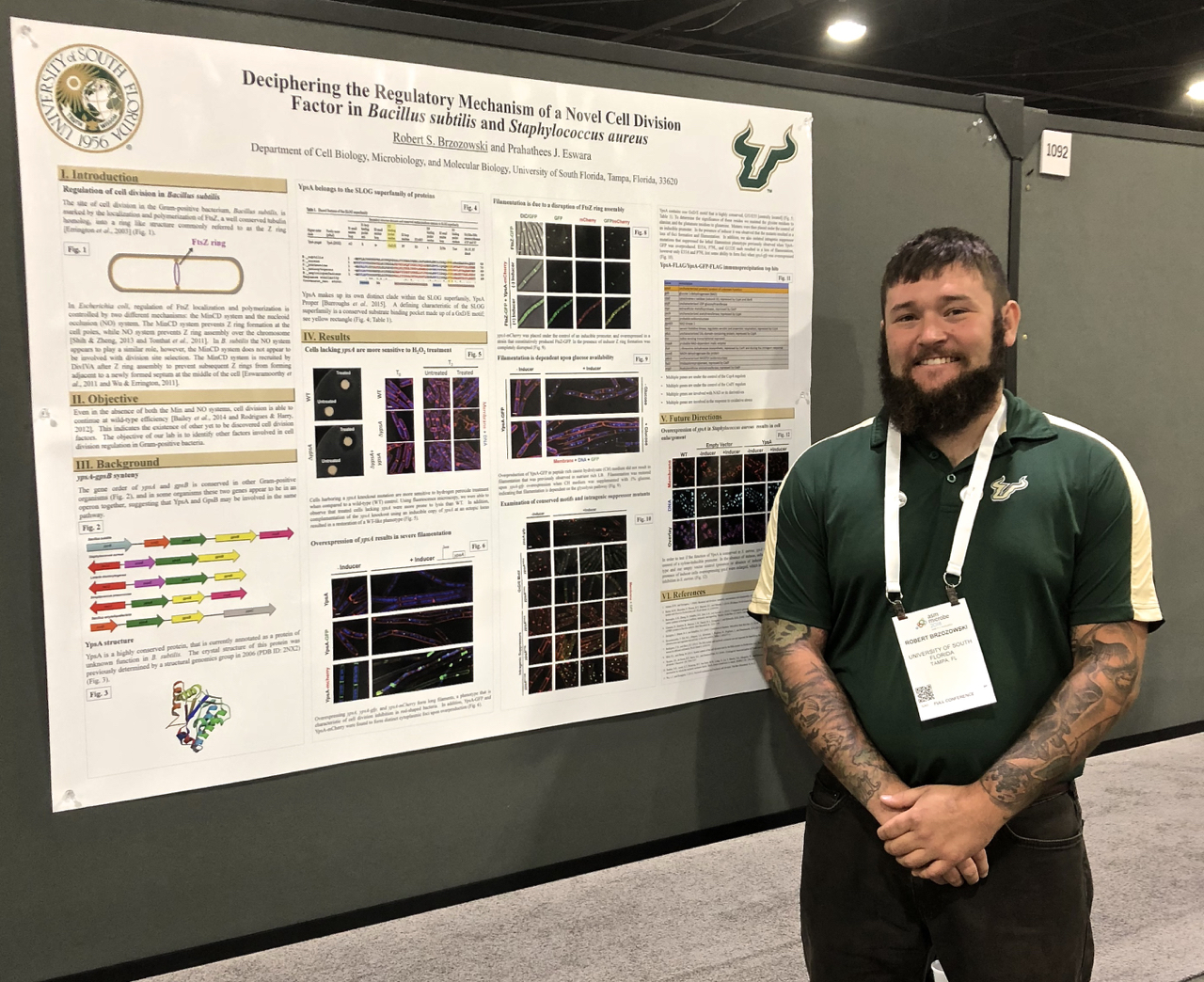Hi, my name is Rob Brzozowski, and I graduated from the University of Scranton in 2015 with a B.Sc. in biology.
 Following graduation, I joined the graduate program at the University of South Florida (USF) as a M.Sc. student in the laboratory of Dr. Prahathees Eswara in the Department of Cell Biology, Microbiology, and Molecular Biology. My research focus was on understanding novel mechanisms underlying cell division in Gram-positive bacteria, namely Bacillus subtilis and the well-known pathogen Staphylococcus aureus. After my first semester in the M.Sc. program I realized that scientific research was what I wanted to do. I found it challenging and rewarding. During the spring of 2016 I applied to the Ph.D. program and was later bumped up from the M.Sc. program during the summer of 2016 to continue my work on bacterial cell division. During my time at USF I also took on numerous collaborative projects with other labs from the university and from around the country. Many of these projects focused on the characterization of novel antimicrobials, or on understanding alternative pathways in which old antimicrobials work. Collectively these projects resulted in multiple publications and the opportunity for me to present my work at conferences both in Florida, and around the nation. Set to finish my degree during the spring of 2020, I began the interview process for a postdoctoral position during the fall of 2019. I wanted to step out of my comfort zone, yet wanted to be able to use the skill set I have been building during the course of my Ph.D. I ultimately interviewed and accepted a position with the laboratory of Dr. Patrick Secor at the University of Montana where I will begin work in an entirely different field starting this summer. I successfully defended my dissertation during the spring of 2020.
Following graduation, I joined the graduate program at the University of South Florida (USF) as a M.Sc. student in the laboratory of Dr. Prahathees Eswara in the Department of Cell Biology, Microbiology, and Molecular Biology. My research focus was on understanding novel mechanisms underlying cell division in Gram-positive bacteria, namely Bacillus subtilis and the well-known pathogen Staphylococcus aureus. After my first semester in the M.Sc. program I realized that scientific research was what I wanted to do. I found it challenging and rewarding. During the spring of 2016 I applied to the Ph.D. program and was later bumped up from the M.Sc. program during the summer of 2016 to continue my work on bacterial cell division. During my time at USF I also took on numerous collaborative projects with other labs from the university and from around the country. Many of these projects focused on the characterization of novel antimicrobials, or on understanding alternative pathways in which old antimicrobials work. Collectively these projects resulted in multiple publications and the opportunity for me to present my work at conferences both in Florida, and around the nation. Set to finish my degree during the spring of 2020, I began the interview process for a postdoctoral position during the fall of 2019. I wanted to step out of my comfort zone, yet wanted to be able to use the skill set I have been building during the course of my Ph.D. I ultimately interviewed and accepted a position with the laboratory of Dr. Patrick Secor at the University of Montana where I will begin work in an entirely different field starting this summer. I successfully defended my dissertation during the spring of 2020.
 My success at USF, as well as my ability to move forward in my chosen career, is, in part, due to the education that I have received from the University of Scranton. I chose Scranton over other institutions mainly due to the small class sizes and outstanding academic reputation. Taking the courses that interested me and building lasting connections to faculty members truly shaped my love for the life sciences, and ultimately resulted in my decision to continue on into graduate school. Beyond course work, Scranton also gave me the opportunity to take part in undergraduate research and I was able to serve as an undergraduate teaching assistant in general microbiology laboratory. These experiences not only reassured me that research in microbiology was my calling, but also gave me a competitive edge over other applicants applying to the same graduate programs as me. The biology department at the University of Scranton truly helped me build a foundation on which the rest of my education has been built upon.
My success at USF, as well as my ability to move forward in my chosen career, is, in part, due to the education that I have received from the University of Scranton. I chose Scranton over other institutions mainly due to the small class sizes and outstanding academic reputation. Taking the courses that interested me and building lasting connections to faculty members truly shaped my love for the life sciences, and ultimately resulted in my decision to continue on into graduate school. Beyond course work, Scranton also gave me the opportunity to take part in undergraduate research and I was able to serve as an undergraduate teaching assistant in general microbiology laboratory. These experiences not only reassured me that research in microbiology was my calling, but also gave me a competitive edge over other applicants applying to the same graduate programs as me. The biology department at the University of Scranton truly helped me build a foundation on which the rest of my education has been built upon.
